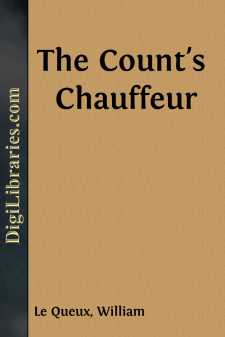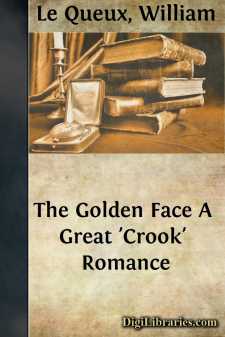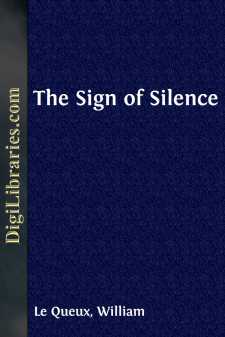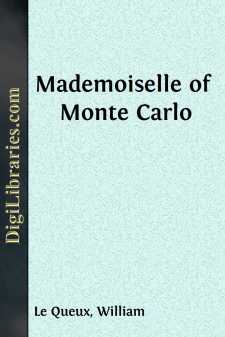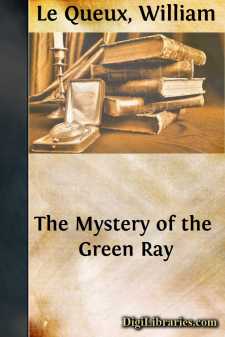Categories
- Antiques & Collectibles 13
- Architecture 36
- Art 48
- Bibles 22
- Biography & Autobiography 813
- Body, Mind & Spirit 142
- Business & Economics 28
- Children's Books 14
- Children's Fiction 11
- Computers 4
- Cooking 94
- Crafts & Hobbies 4
- Drama 346
- Education 46
- Family & Relationships 57
- Fiction 11828
- Games 19
- Gardening 17
- Health & Fitness 34
- History 1377
- House & Home 1
- Humor 147
- Juvenile Fiction 1873
- Juvenile Nonfiction 202
- Language Arts & Disciplines 88
- Law 16
- Literary Collections 686
- Literary Criticism 179
- Mathematics 13
- Medical 41
- Music 40
- Nature 179
- Non-Classifiable 1768
- Performing Arts 7
- Periodicals 1453
- Philosophy 64
- Photography 2
- Poetry 896
- Political Science 203
- Psychology 42
- Reference 154
- Religion 513
- Science 126
- Self-Help 84
- Social Science 81
- Sports & Recreation 34
- Study Aids 3
- Technology & Engineering 59
- Transportation 23
- Travel 463
- True Crime 29
The Count's Chauffeur
by: William Le Queux
Description:
Excerpt
A MOVE ON THE “FORTY”
In Paris, in Rome, in Florence, in Berlin, in Vienna—in fact, over half the face of Europe, from the Pyrenees to the Russian frontier—I am now known as “The Count’s Chauffeur.”
An Englishman, as my name George Ewart denotes, I am of cosmopolitan birth and education, my early youth having been spent on the Continent, where my father was agent for a London firm.
When I was fourteen, my father, having prospered, came to London, and established himself as an agent in Wood Street, City, representing a great firm of silk manufacturers in Lyons.
At twenty I tried City life, but an office with a high stool, a dusty ledger, and sandwich lunches, had no attraction for me. I had always had a turn for mechanics, but was never allowed to adopt engineering as a profession, my father’s one idea being that I should follow in his footsteps—a delusive hope entertained by many a fond parent.
Six months of office life sufficed me. One day I went home to Teddington and refused to return again to Wood Street. This resulted in an open quarrel between my father and myself, with the result that a week later I was on my way to Canada. In a year I was back again, and, after some months of semi-starvation in London, I managed to obtain a job in a motor factory. I was then entirely in my element. During two years I learned the mechanism of the various petrol-driven cars, until I became classed as an expert driver and engineer.
At the place I was employed there was manufactured one of the best and most expensive makes of English car, and, being at length placed on the testing staff, it was my duty to take out each new chassis for its trial-run before being delivered to a customer.
Upon my certificate each chassis was declared in perfect running order, and was then handed over to the body-makers indicated by the purchaser.
Being an expert driver, my firm sent me to drive in the Tourist Trophy races in the Isle of Man, and I likewise did the Ardennes Circuit and came in fourth in the Brescia race for the Florio Cup, my successes, of course, adding glory and advertisement to the car I drove.
Racing, however, aroused within me, as it does in every motorist, an ardent desire to travel long distances. The testing of those chassis in Regent’s Park, and an occasional run with some wealthy customer out on the Great North Road or on the Bath or Brighton roads, became too quiet a life for me. I was now seized by a desire to tour and see Europe. True, in my capacity of tester, I met all classes of men. In the seat beside me have sat Cabinet Ministers, Dukes, Indian Rajahs, Members of Parliament, and merchant princes, customers or prospective purchasers, all of whom chatted with me, mostly displaying their ignorance of the first principles of mechanics. It was all pleasant enough—a merry life and good pay. Yet I hated London, and the height of my ambition was a good car to drive abroad.
After some months of waiting, the opportunity came, and I seized it.
By appointment, at the Royal Automobile Club one grey December morning, I met Count Bindo di Ferraris, a young Italian aristocrat, whose aspect, however, was the reverse of that of a Southerner....


